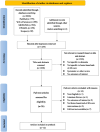Home-based end-of-life care for people with dementia: A systematic review of quantitative and qualitative evidence
- PMID: 39676301
- PMCID: PMC11997294
- DOI: 10.1177/14713012241308625
Home-based end-of-life care for people with dementia: A systematic review of quantitative and qualitative evidence
Abstract
Background: Integrating home-based end-of-life care for people with dementia will become increasingly important as the population ages. Therefore, it is timely and necessary to evaluate the evidence of home-based end-of-life care for people living with dementia. Aim: This review aims to identify the characteristics of home-based end-of-life care interventions for people living with dementia and review the existing evidence on implementation outcomes. Design: Systematic Review and Narrative Synthesis. The Mixed Methods Appraisal Tool was used to assess study quality. Data sources: A comprehensive search was conducted across five databases (PubMed, Web of Science, MEDLINE CINAHL and Scopus) from June to August 2023, and the citations to the included studies were tracked through citation tracking in Google Scholar to identify potentially relevant studies. Results: Of the 2022 articles retrieved, 12 were included in this review. The included studies were geographically diverse, with four from the United States, three from Singapore, two from the United Kingdom, and one each from the Netherlands, Belgium, and Israel. Additionally, due to the difference of focus and nature of the studies, only seven of these studies provided information on home-based end-of-life care interventions for people living with dementia. The interventions identified in this review align closely with the essential components of optimal palliative care for dementia outlined in the European Association for Palliative Care white paper. However, the evidence supporting these home-based end-of-life care interventions for people living with dementia is constrained by the number of studies and methodological limitations. Nevertheless, this systematic review still identifies some evidence supporting home-based end-of-life care for people living with dementia, including reduced healthcare utilization and costs, as well as help people living with dementia realize their wish to die at home. Conclusions: Whilst current evidence highlights benefits of home-based end-of-life care for people living with dementia, the relatively limited number, methodology of studies, the heterogeneity of study focus and outcome measures hinder the formation of definitive conclusions. Therefore, further research is needed to develop and evaluate home end-of-life care services for people living with dementia.
Keywords: dementia; end-of-life care; home; hospice care; palliative care; review.
Conflict of interest statement
Declaration of conflicting interestsThe author(s) declared no potential conflicts of interest with respect to the research, authorship, and/or publication of this article.
Figures
Similar articles
-
Bring dying at home: What facilitates and hinders home-based end-of-life care for people living with dementia?-A systematic review and meta-ethnography protocol.PLoS One. 2024 Dec 30;19(12):e0316446. doi: 10.1371/journal.pone.0316446. eCollection 2024. PLoS One. 2024. PMID: 39774448 Free PMC article.
-
Beyond the black stump: rapid reviews of health research issues affecting regional, rural and remote Australia.Med J Aust. 2020 Dec;213 Suppl 11:S3-S32.e1. doi: 10.5694/mja2.50881. Med J Aust. 2020. PMID: 33314144
-
Impact of home healthcare on end-of-life outcomes for people with dementia: a systematic review.BMC Geriatr. 2022 Jan 27;22(1):80. doi: 10.1186/s12877-022-02768-3. BMC Geriatr. 2022. PMID: 35081914 Free PMC article.
-
Palliative care for people with dementia living at home: A systematic review of interventions.Palliat Med. 2019 Jul;33(7):726-742. doi: 10.1177/0269216319847092. Epub 2019 May 6. Palliat Med. 2019. PMID: 31057088 Free PMC article.
-
Interventions and Predictors of Transition to Hospice for People Living With Dementia: An Integrative Review.Gerontologist. 2025 Apr 9;65(5):gnaf046. doi: 10.1093/geront/gnaf046. Gerontologist. 2025. PMID: 39903194 Free PMC article. Review.
References
Publication types
MeSH terms
LinkOut - more resources
Full Text Sources
Medical


